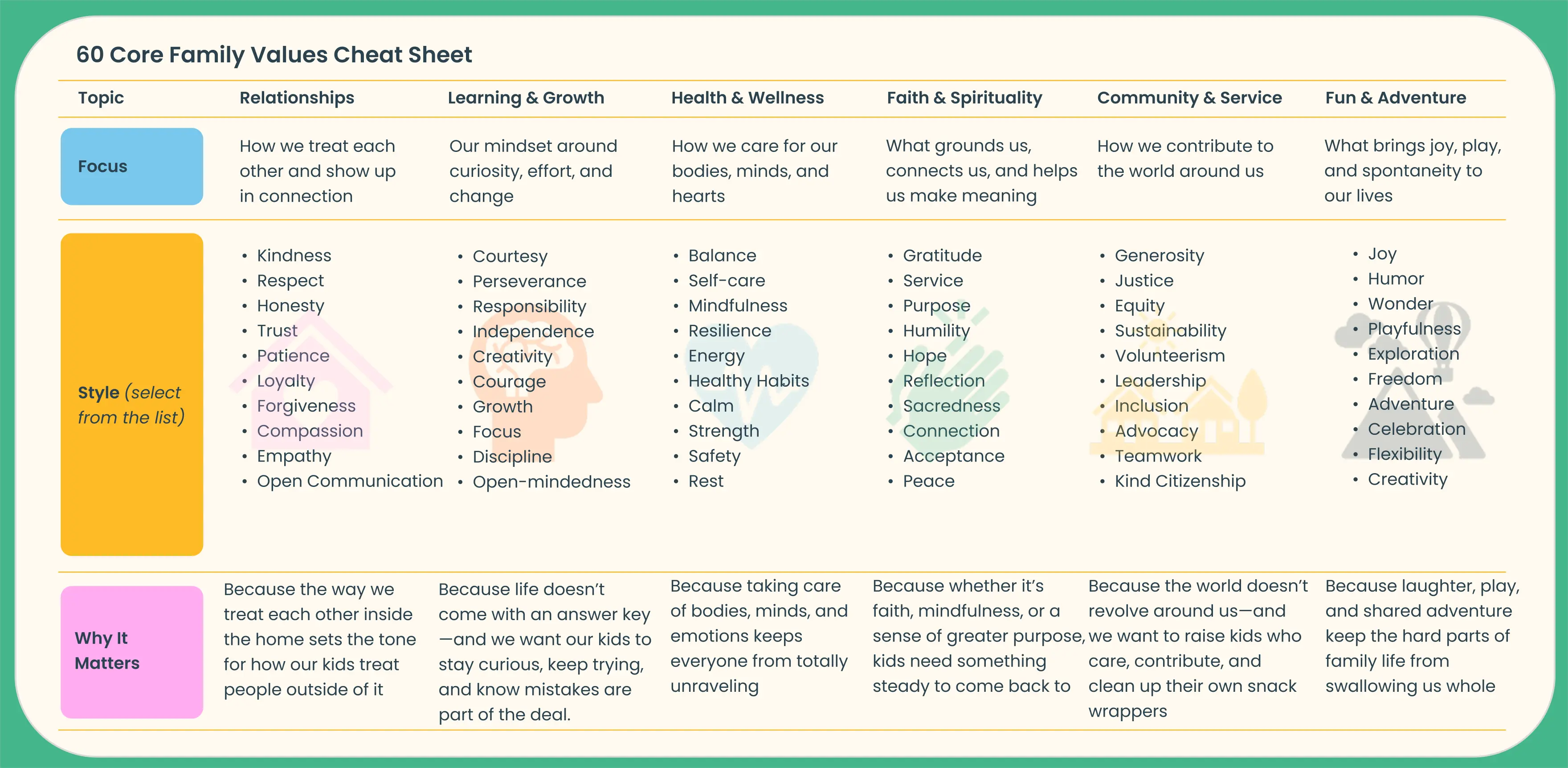Family Core Values 101: How to Define What Matters Most in Your Home

In a world full of noise and choices (and a million snack requests before 9am), family values are what keep you grounded. They’re the compass behind how we parent and create a home that doesn’t just survive—but thrives.
But how do you define your family values? And what is the best way to teach values to children? We’re here to help you begin to define what matters most in your home, so your parenting decisions have a backbone—and your kids grow up with something solid to stand on.
Here's what you need to know about building a family values plan that works for you.
What Are Family Core Values (And Why Do They Matter)?
If values are defined by worth, then core values are the things you hold the dearest. They’re the beliefs that guide your choices—from how you handle meltdowns in the cereal aisle to how you talk about kindness, courage, or what it means to be a good human.
Certain core values are universal (love, honesty, respect), and others are unique to your family (forgiveness, perseverance, loyalty, courage). They define your family culture, influencing everything from important milestone decisions to daily parenting advice. And when they’re clear? They make parenting feel a whole lot less like guesswork.
The Benefits of Defining Core Family Values
When your values are clear, parenting becomes less reactive and more intentional. And, your children benefit too. Having clear family values allows your child to feel more connected too.
With clear core family values, you make fewer decisions on the fly—and you model consistency your kids can count on. When kids feel connected to your family values, they’ll mirror them out in the world—even when you’re not there.
Here are some of the benefits of defining your family values:
- Build a sense of security: Shared values = shared trust. Kids feel safer when they know what your family stands for.
- Make parenting choices easier: When values are clear, decisions don’t feel like guesses—they feel grounded.
- Turn values into discipline that works: Your rules make more sense when they’re rooted in something bigger than “because I said so.”
- Improve communication (even mid-meltdown): Values give you a shared language for talking, listening, and solving problems like a team.
- Lay the groundwork for strong character: When kids know what matters most at home, they’re more likely to act with integrity—inside and outside your walls.
Still not convinced? Here’s what the research says:
- While children's values become more aligned with their peers over time, early family life has a huge influence in shaping foundational values and behaviors for kids.
- Engaging in quality family time has also been linked to improved mental health outcomes in children, reducing the risk of depression and anxiety.
- Family values serve as guiding principles for behaviors and decision-making, which influences every aspect of life, including attitudes and relationships.
How to Identify Your Family’s Core Values
Not sure where to start? Ask each member of the family to do some self-reflection. Depending on the age of your children, this might look different. As your child gets older, they will be able to participate more in the conversation. And remember, this conversation is not a one-and-done! Rather, you’ll continue to revisit this conversation.
Here are some helpful starter questions to get the wheels turning.
What are some things we’re grateful for as a family?
Gratitude is a window into what we really value. Whether it's a warm meal, a shared laugh, or the rare bedtime with zero tears, these moments reveal what matters most to your crew. Try asking your kids what made them smile today—you might uncover a love for togetherness, humor, or the simple joy of feeling safe and seen.
The more you notice the good, the clearer your family's core values become.
What's most important to us as a family?
This is your chance to define what really matters—who you are as individuals, and who you want to be together. What do you expect from each other? What do your kids need from you? And what values do you hope they'll carry into the world?
Some people may put a high value on structure and discipline, while others may be more focused on creativity and flexibility. There’s no perfect formula—only what fits your family. Your values should reflect your real life, not someone else’s idea of how it “should” be.
Who Are Your Role Models and Why?
Identify role models with qualities and behaviors you admire. Yes–this may mean a discussion on the admirable traits of Bluey, but using something tangible to anchor the conversation around can be a helpful tool to explain things to your kids.
What Are Some Experiences That Shape Our Values?
Life has a funny way of teaching us what really matters. A proud moment—like watching your kid stand up for a friend—can spotlight a core value like courage or kindness. And yes, even that epic public tantrum can spark a new family rule (or at least a great story). Every high and low is a chance to define what you stand for.
A Step-by-Step Guide to Defining Your Family’s Core Values
After everyone has done their self-reflection pre-work, you’re ready to start putting those values down on paper. But how many values should your family have? And how do you prioritize them? Here’s a step-by-step guide on how to craft a set of core values for your family.
- Step 1: Call a Family Huddle. Pick a time when everyone’s fed, alert, and focused (read: not right before bedtime). Put phones away and ask everyone to come with an open mind.
- Step 2: Brainstorm Together. What words or themes came up in your self-reflection? Create an unfiltered list—group similar ideas into categories, noting values that come up more than once with a star.
- Step 3: Narrow It Down. Pick your family’s top 5–10 values from the brainstorm list. If play, laughter, and togetherness were themes that came up—Great! “Joyful Connection” may be what you value and make time for. Don’t overthink it—go with what feels true and doable.
- Step 4: Get Specific. For each value, define what it actually looks like in your daily life. “Respect” might mean listening when someone’s talking—or not hiding your sister’s favorite stuffy.
- Step 5: Make It Stick. Turn your values into something visual—this can be especially helpful for younger kids. Try a values board or a sticky note on the fridge. Whatever keeps it front and center in your day-to-day. Involve your child in creating this, as their involvement will guarantee a stronger buy-in.
Still not sure how to get going? We’ve rounded up 60 value words across 6 core areas of family life. Use this cheat sheet to spark conversation, guide decision-making, or just finally agree on something besides pizza toppings.

There’s no “perfect” list of family values—just the ones that feel true to your home. Whether you pick five or circle twenty, the real magic comes from living them out, not writing them down.
So go ahead: pick your words, talk about them, laugh about them, maybe even put them on the fridge. Because when your values are clear, your parenting gets a whole lot easier (and your house gets a whole lot calmer).
Living Your Family Values Every Day
Defining your values is just the start—positive change only happens when you follow through. Kids learn from watching you, so take the lead on incorporating these values into your daily lives. If “honesty always” is one of your values, and your kid catches you in a harmless lie (see: “the ice cream truck only plays music when it’s out of ice cream”), then what are they learning?
Try these tips to put your new values into motion:
- Model your values (even when no one’s looking)
- Bring values into daily convos (at dinner, bedtime, car rides)
- Highlight and praise when you see your child practicing or displaying these values
- Encourage choices that align with your values (“That was brave of you to speak up when something felt wrong.”)
- Keep the tone honest, not preachy
You’re not raising robots—you’re raising humans. Show them how values guide real-life decisions, especially when it’s hard.
Poppins expert, Dr. Chloe Massey explains, Kids don’t just learn values from what we say—they learn from what we do, especially in those messy and in-between moments. They are always watching! Living your values out loud—both imperfectly and consistently—is what teaches your child how to carry those values into their own lives.”
Adjusting and Evolving Your Family’s Core Values Over Time
Your family will change as your child (or children) grow up. Your values might too.
Take time to revisit your values. Values that center around protection, obedience, and parental authority may need to evolve to trust, independence, and mutual respect. If it helps you, schedule time to check in on your values.
If you think the list is due for an adjustment, don’t way. The key is to maintain flexibility. Values are a living, breathing thing—if something prompts a change, pose the question: “Should this be a value?”
Final Thoughts: Creating a Home Where Values Thrive
How do you define your family values? How can I help my child with moral development? What is the best way to teach values to children? Why is family important?
Answering these questions gives you time and space to reflect on what's important. Defining your family’s core values isn’t about creating the perfect home—it’s about creating a home that means something to you and your family
It’s what makes your family yours.
And if you need help putting values into practice, navigating big parenting choices, or handling the messier moments with more intention? That’s what Poppins is for. We help families build homes that reflect what they care about most.


